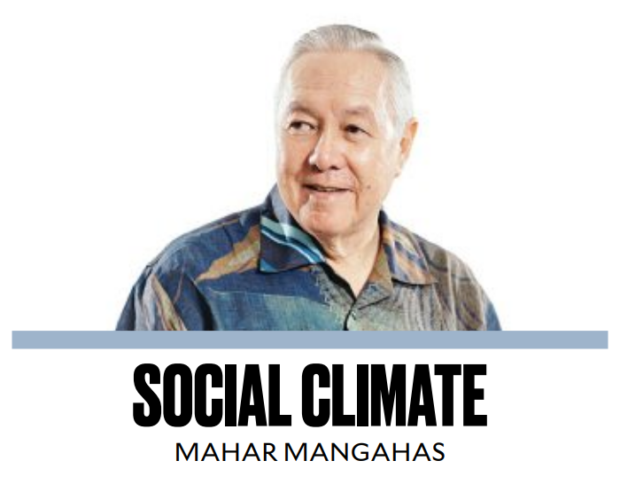Last week’s article couldn’t accommodate the proposal for the next step in social indicators research at the Development Academy of the Philippines (DAP), following an initial work that delineated the principles and surveyed the secondary data (“‘Social indicators’ started it all (1),” 6/3/23). In my conversation with DAP executive vice president Jose P. “Ping” de Jesus, I suggested that we start producing the indicators via social surveys and disseminate them publicly. “You mean like weather indicators?” he asked. “Yes, but these would be social weather indicators,” I replied. Ping appreciated the concept, and I accepted his offer to lead a newly established DAP department called Research for Development, which I abbreviated as RfD.
I reflected on the pros and cons of my decision. Leaving my job as an economics professor at the University of the Philippines (UP) Diliman and missing out on the arrival of new bright students every year were the downsides, while having the opportunity to gather primary data on subjects of my choosing was the upside. I explained to UP President Edgardo Angara that DAP drew me in and not that UP pushed me away.
RfD’s primary undertaking, the Social Weather Stations (SWS) project, was launched to conduct regular surveys that would produce updated social indicators for the country. With a small team of interviewers, RfD conducted several surveys on the quality of life, including a few in Metro Manila in 1981 and 1982 and one nationally from March to May 1983. The surveys were principally funded by the President’s Center for Special Studies (PCSS) and are currently an invaluable source of statistically representative data on Filipinos’ political and economic perspectives before Ninoy Aquino’s assassination in August 1983. However, the survey findings were not reported upstairs to Marcos, the president at the time, because it was PCSS’s job, and he was known to have a hard time digesting statistics without sugar-coating.
RfD planned to release a book containing the 1981-82 RfD surveys titled “Measuring the Quality of Life: A 1982 Social Weather Report.” Still, DAP abruptly changed its mind before it went to print in early 1983. The reasons behind the book’s suspension are not known, and we don’t know who was against it, frustrating our hopes of having an open system of social indicators that the Marcos government could tolerate. RfD disbanded shortly after my resignation from the DAP in 1984.
In 1984 and 1985, the Bishops-Businessmen’s Conference for Human Development (BBC), a civic organization composed of Catholic bishops, businessmen, labor leaders, and academics, conducted two surveys on sociopolitical issues nationwide, with partial funding from private entrepreneurs and the Asia Foundation. I accepted the position of technical director at their request, and the surveys were carried out independently of DAP. The critical discovery was that 60% of Filipinos opposed executive authority regarding legislation by decree and detention by fiat. As a result, media reports of the 1984 BBC survey identified me not only as a BBC member but also as a DAP vice president, causing some awkwardness. I explained to Ping de Jesus that if I had alerted him earlier, he would have felt obliged to advise me, but he wasn’t aware of the BBC survey. DAP was under close watch by the Marcos administration since Horacio “Boy” Morales, Ping’s predecessor, joined the National Democratic Front in December 1977, and it would not have brushed aside my role in the BBC survey in light of my DAP rank.
I submitted my resignation to him, which would take effect after a scheduled social indicators training program for international participants at DAP Tagaytay. Social indicators research necessitates more than a single person’s effort. We were fortunate enough that the investigation continued thanks to the Almighty. In August 1985, Ping de Jesus and I founded the Social Weather Stations (www.sws.org.ph) with six other colleagues. It’s a nonstock, nonprofit, nonsectarian, and nonpolitically aligned organization that conducts scientific research on “social weather” issues, backed by its diverse membership of dozens of Fellows who determine its future research direction.
—
Contact: [email protected].
Denial of responsibility! VigourTimes is an automatic aggregator of Global media. In each content, the hyperlink to the primary source is specified. All trademarks belong to their rightful owners, and all materials to their authors. For any complaint, please reach us at – [email protected]. We will take necessary action within 24 hours.


